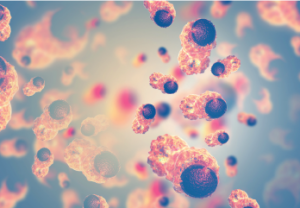
Cancer cells
SAN DIEGO—New insights into how scleroderma and myositis may be linked with cancer have led to intriguing questions that could impact patient care, experts said at the 2017 ACR/ARHP Annual Meeting in November.
Understanding the relationship between cancer and rheumatic diseases is important because rheumatologists are seeing more and more patients with both diseases, and treating both conditions at the same time poses a challenge, said Ami Shah, MD, MHS, director of clinical and translational research at the Johns Hopkins Scleroderma Center in Baltimore.
Researchers have found that scleroderma patients with anti-RNA polymerase-3 (POL3) or anti-RNPC-3 antibodies, and myositis patients with TIF1-gamma or NXP-2 antibodies, are more likely to develop cancer right around the time of the onset of their rheumatic disease. And evidence has emerged that naturally occurring anti-tumor immune responses directed at altered autoantigens in cancers may spread, possibly giving rise to these autoimmune disorders.
Antibody subsets can help define a patient’s cancer risk, Dr. Shah said. For example, she and her colleagues found that relative to patients with anti-centromere antibodies, scleroderma patients with anti-POL3 or anti-RNPC3 antibodies carried a fourfold risk of developing cancer within a short interval of scleroderma onset.
In other research, among 213 dermatomyositis patients assessed at Hopkins and Stanford University, 83% of those with cancer-associated dermatomyositis were identified by anti-NXP-2 or anti-TIF-1-gamma antibodies.
But many questions remain, Dr. Shah said.
“Is aggressive cancer screening warranted in these patients, and does early cancer detection improve both cancer and rheumatic disease outcomes?” she said. So far, we don’t have much hard data to answer this.
Can Cancer Treatment Affect Autoimmune Disease?
In one intriguing case recently published, a 43-year-old woman with diffuse scleroderma and polymyositis overlap with anti-PM/Scl antibodies, was found to have a solid pseudopapillary pancreatic neoplasm. When the cancer was resected—she didn’t receive chemotherapy—she was quickly weaned off immunosuppression, and her skin thickening and myositis resolved.
“If rheumatic diseases may be a manifestation of an underlying cancer, could cancer therapies [treat] rheumatic disease?” she asked. “I think at the end of the day, this is the question we all really care about.”
The session also covered the challenges and risks of using immune checkpoint inhibitors with autoimmune diseases. The growing use of immune checkpoint inhibitors (ICIs) for all types of cancer poses a particular challenge for rheumatologists, said Laura Cappelli, MD, MHS, assistant professor of medicine at the Johns Hopkins Arthritis Center in Baltimore, Md. The drugs work by blocking negative costimulatory molecules—essentially, “taking away the stop light,” she said—and boosting T cell activation. There are six FDA-approved ICIs, with even more tumor types, drugs and combinations likely to enter the fray.



